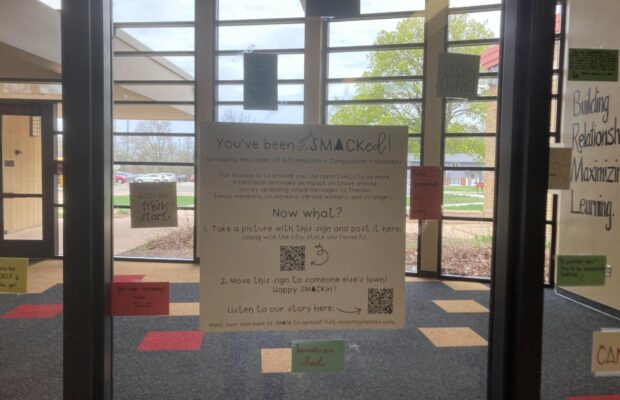The Hard Life: CFHS graduate works to get life back on track
By Arlene Freudenberg 2009
Many people grow up ignorant of the fact that there are people whose lives are less glamorous than their own. They grow up not understanding how hard it is to survive in the world once someone has made mistakes.
Recent CFHS graduate, we’ll call him John, is one example of someone who works extra hard just to survive. He barely made it through high school and didn’t even try to go to college.
He spent most of his time in his room playing computer games, and hung out with the wrong crowds, and eventually he broke into his high school with the intention to steal.
“Breaking into a high school, some people may have thought that made my life worse. But what I got now, it means so much to me. If I got a chance to change it, I wouldn’t. I don’t regret anything,” he said.
John certainly does not recommend this behavior.
He currently lives in a small apartment with his fiancée and their two kids. He works long hours for little pay. The demands are often difficult to balance.
“Trying to find a balance between working long hours so I can get money that I need and time to spend with my family is probably the hardest thing,” John said.
Even though John’s family does get a little help, it’s not enough to thrive on.
“Having access to food stamps only helps so much. Most of the time, toward the end of the month, we’re scraping for food. But as long as the kids are fed, I really couldn’t care less if I’m hungry when I go to bed at night,” he said.
Priorities change for people in similar positions to John.
“What happened to me? I used to get excited about buying video games. Now I’m excited about buying diaper bags,” John said.
John didn’t take his jobs seriously and often bounced from one to the other until reality hit him.
“I’ve had five jobs since high school. It wasn’t until I started putting together a family before I kept one. I liked having money and spending it on whatever I wanted, but now I need the money to spend on what my family needs,” he said.
But construction is no dream job for John. It’s a job he’s forced to do because, currently, there’s little else he can do with only a high school diploma.
“I am stuck in a job that won’t take me anywhere in my life, and I don’t want to do it for the rest of my life. If I went to college I’d be able to do what I wanted,” John said.
John is determined to make a difference with his life.
He doesn’t want to waste away in construction. He understands that if he does not make changes in his life, no one else will.
“This winter I’m hoping to go to Hawkeye to take some general ed. classes. I get laid off in the winter. I’m just wanting to take it one step at a time,” he said.
John’s parents had his life all set up for him; they tried to help him and motivate him to do better, but he chose to not take advantage of their help.
“All that talk your parents gave you about high school being the destiny of your lives. When you’re out of high school, you’ll find out they were right and you’ll absolutely hate that,” he said.
Like many, John didn’t like doing his school work. He chose to not work in school. Now, looking back on his education, he sees it in a different light.
“Homework is a part of high school. High school seems not that important while you’re in high school, but as you leave high school you’ll find how important it really was,” he said.
With a very low GPA, a criminal record and a disappointed family, John barely slid by.
“I think he really regrets not going to college,” his step mom said. “He had it all set up, and he knew all he had to do was get on board, but he didn’t.”
Even though John made some bad choices in life, his parents recognize that he is trying to correct his mistakes.
“We’re really proud of him. He’s really stepped up taking responsibility for his actions,” John’s parents said.
John has gained a lot of life perspective from his many trials and triumphs. He hopes that his life can serve as a lesson for the many students that do not care about their education and their lives.
There is certainly a life worth living outside of high school and high school serves as a venue to get there.
For all the kids who think nothing bad could ever happen to them, John said, “I have a friend that swore we’d live to old age together on a ranch or a farm house. He died a couple weeks ago. If you think nothing will happen to you, then you’re just naïve.”
Staff take many steps when students stray
By Rachel Connelly 2010
Kids find trouble all the time, but parents, friends and CFHS staff face pressure to keep them from getting into this trouble in the first place or helping them once they get there.
“Sometimes they start referring themselves or parents call. Teachers can tell us if they’re skipping classes. Teachers tell us if they’re acting strangely. Students tell us about their friends,” guidance counselor Susan Langan said.
Principals deal with the paper work before the students.
“I have a list of student transcripts. We have a list of tardies and truancies to try to catch them. I have a lot of data to use with attendance and grades. We meet with the guidance department,” associate principal Dana Deines said.
Teachers have ways to tell if students in their classes are having problems, too.
“Struggling students are usually easy to spot because they are either trying to ‘hide’ from me and keep a very low profile or they are looking for attention,” foreign language teacher Linda McCormack said.
It’s not always that easy, however.
“Often identifying troubled students is difficult, but some of the signs are declining grades and loss of motivation or apathy in the classroom,” social studies teacher Chris Dyvig said.
The problems vary among students, whether it’s mental, academic or attendance.
“If it’s drug or alcohol use, we refer them to Pathways, and they do a substance abuse evaluation. If they’re suicidal, we call their parents because we’re mandatory reporters. We send them to the hospital for a mental health evaluation,” Langan said.
The guidance office also tries to prevent problems.
“We have a little one-on-one counseling. In the past, we’ve run small support groups, like the changing families program,” Langan said.
The small support groups are helpful because students are more apt to listen to another student that has been through the problem than they are to listen to their parents.
It’s important for students to get help if they need it.
“If students know of someone who’s not sharing, let an adult know. Keeping it a secret isn’t going to help anyone. We’ll keep it confidential unless they’re suicidal,” Langan said.
A possible issue is that the student may get into legal trouble.
“Most students are reasonable and their behavior eventually changes. If seriously troubled students are not caught and helped, chances are good that some will end up in the court system while the rest of them will probably outgrow those tendencies,” McCormack said.
Another issue that comes up is students who don’t graduate.
“We’d like to see every student graduate. We have a really high graduation rate; the dropout rate is less than one percent,” Deines said.
Anything greater than zero percent means that someone dropped out and wasn’t reached in time.
It’s important to help everyone who may need help. All problems are important to catch.
“You only get one life—bad decisions make your life a lot more difficult,” Dyvig said.








You must be logged in to post a comment Login